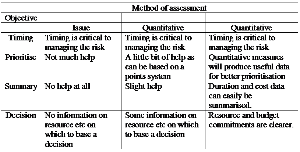Risk management - Common methods of assessing risk 2
Common methods of assessing risk 2
The common methods of assessing risk each have their good and bad points.
Timing
All of the methods require implementation early. There is a common need to identify risks, responses and impacts as early as possible so that appropriate plans can be put in place.
Timing of the risk management process has been discussed elsewhere [see The Risk Management Process].
Prioritise
Once you have assessed the situation do the methods help in prioritising the available resource? The best of these will be the quantitative approach as it is easier to see the committed resource levels.
The issue based method gives no indication that will allow you to prioritise the risks, the scoring systems are little better.
The quantitative method provides a firmer basis for prioritising the risks.
Summary
Individual risks must be combined in some manner to get an overall (and interim) view of how the risks affect the expected costs and durations of the project.
The only method of examining the risks that can do this is the quantitative approach.
Decision
Each method can support the decision making process. However, as the data form the quantitative method will be more reliable this will lead to more informed decision making.
The others lack suitable information on resource and hence cost data.



